So FYI, perfumes can do more than just help us smell pretty. And even though that's usually the endgame with our favorite fragrances, it's kind of awesome to know that with the right ingredients and know how, we can smell pretty AND provide our bodies with a little TLC. These days many mainstream perfumes are almost entirely chemically created. Which unfortunately means for some, that these chemicals can easily cause irritation, allergic reactions, and even hormonal imbalance. So of course like all the evils in this world, there is an easy and affordable alternative to smelling amazing AND feeling amazing all while saving your skin the aggravation. The only catch is to put down that beloved bottle of Calvin Klein Obsession and go pick up a few essential oils from your local health food store.
Maybe essential oils can seem intimidating - they come in miniature bottles which almost immediately implies their powers to be so great you only need 1 oz. And are often labeled with plant names you've never even heard of. But once you get past the initial fear, you'll feel like you're in on some elite mother nature club.
Essential oils are made from highly concentrated aroma compounds of plants, specifically the leaves, stems, flowers, bark, roots, seeds, and other raw plant material. The liquid is extracted via distillation by steam or water, or if is citrus then often cold-pressed. But extraction methods vary due to the plant. As we've often discussed the role of herbalism as medicine, essential oils too provide various healing properties i.e. aromatherapy. These properties are dependent on the plant they came from. Because many essential oils are highly antiseptic, it can be dangerous to apply high concentrations directly to the skin. So if you are looking to use these oils as a more powerful pharmacology tool, be advised to speak to a professional or do thorough research first. But of course essential oils can easily be used for more casual purposes, like our perfumes, with still being beneficial to both mind and body.
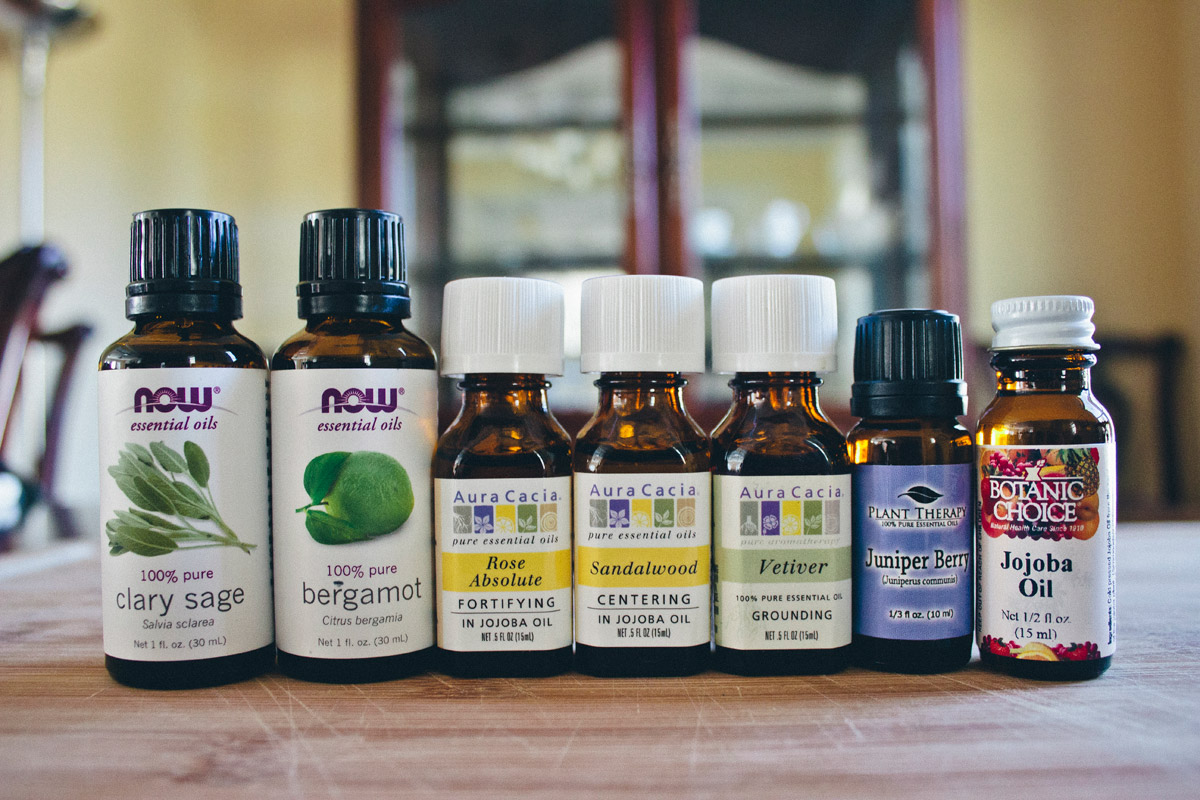
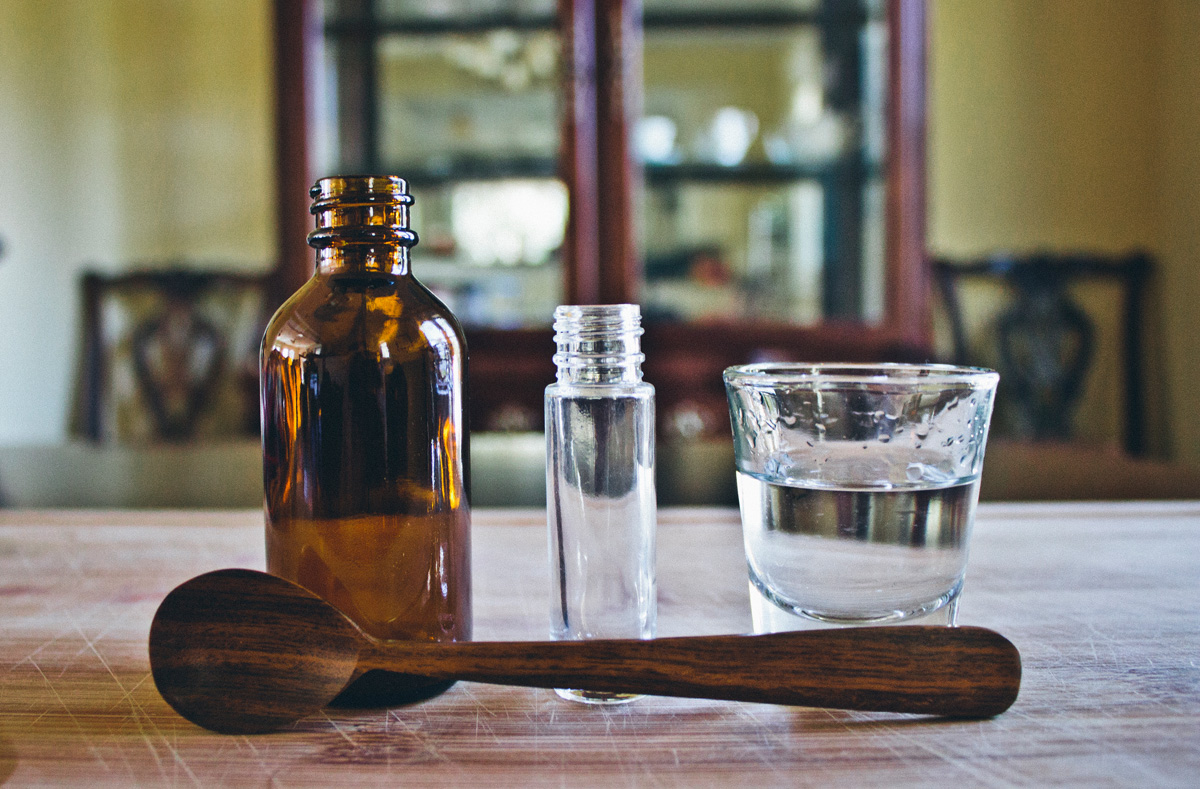
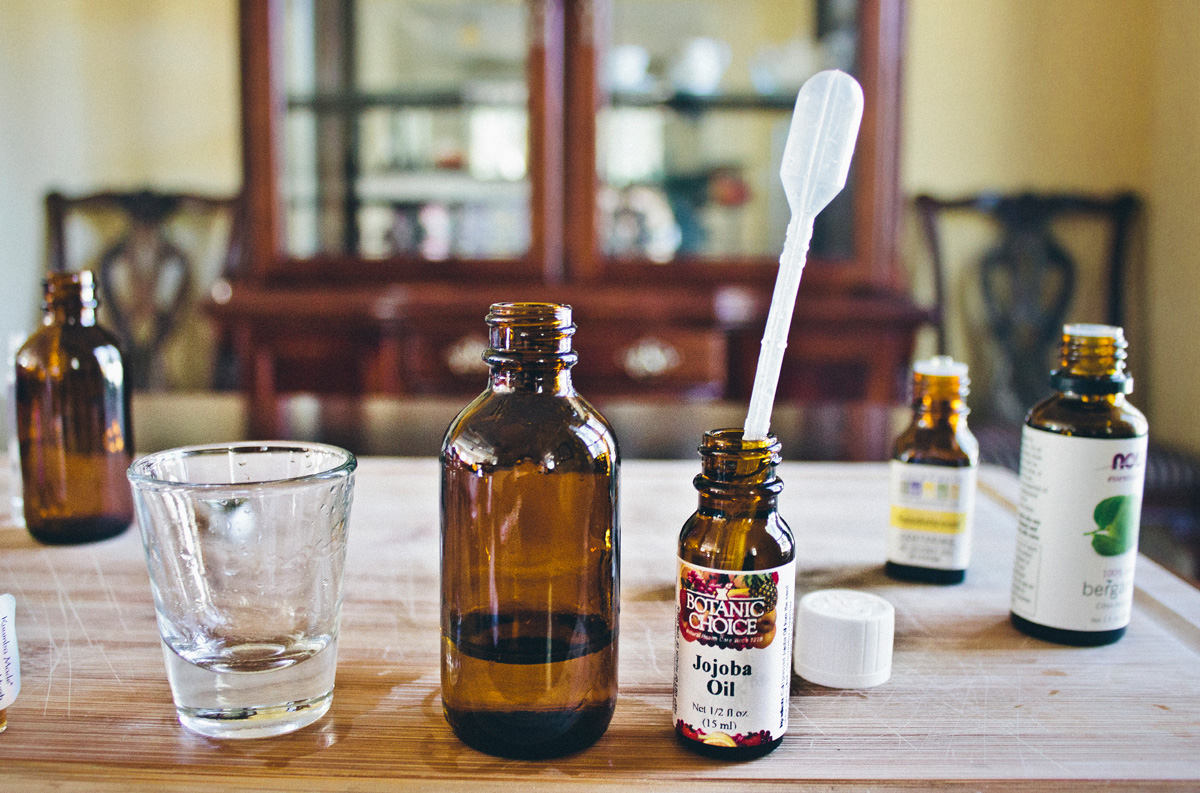
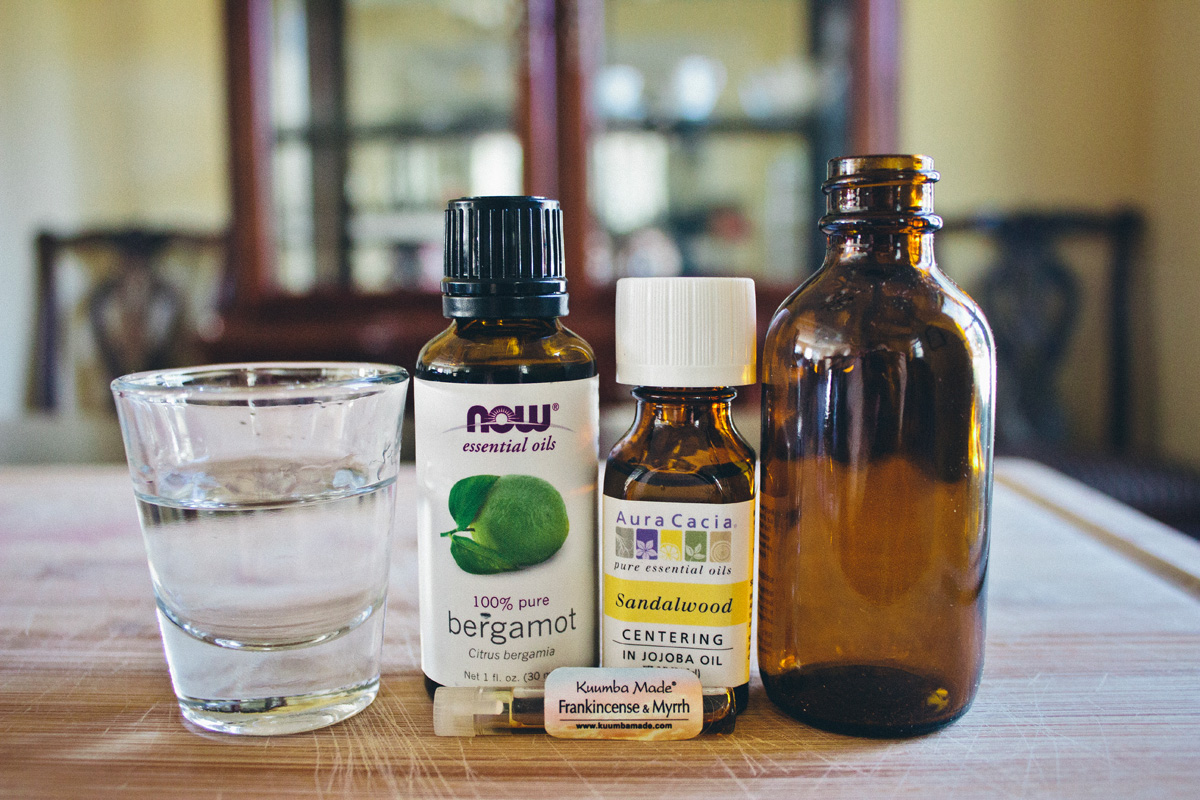
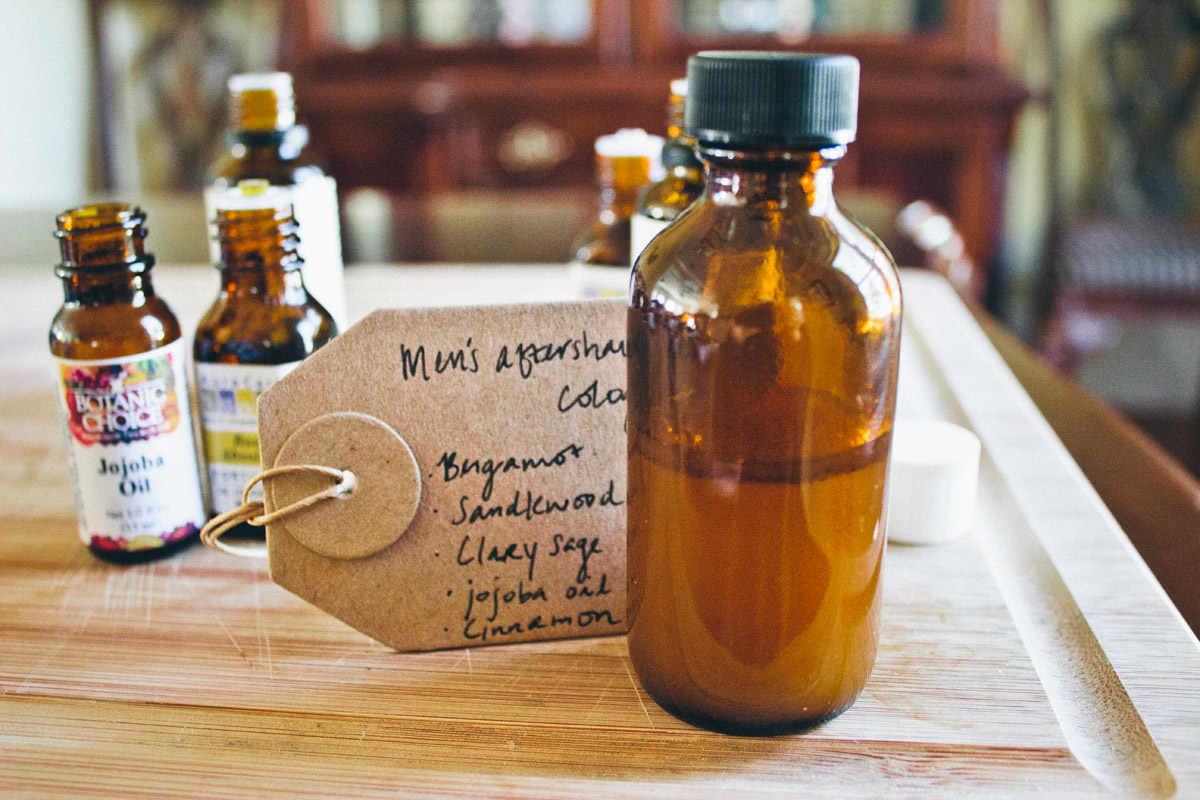
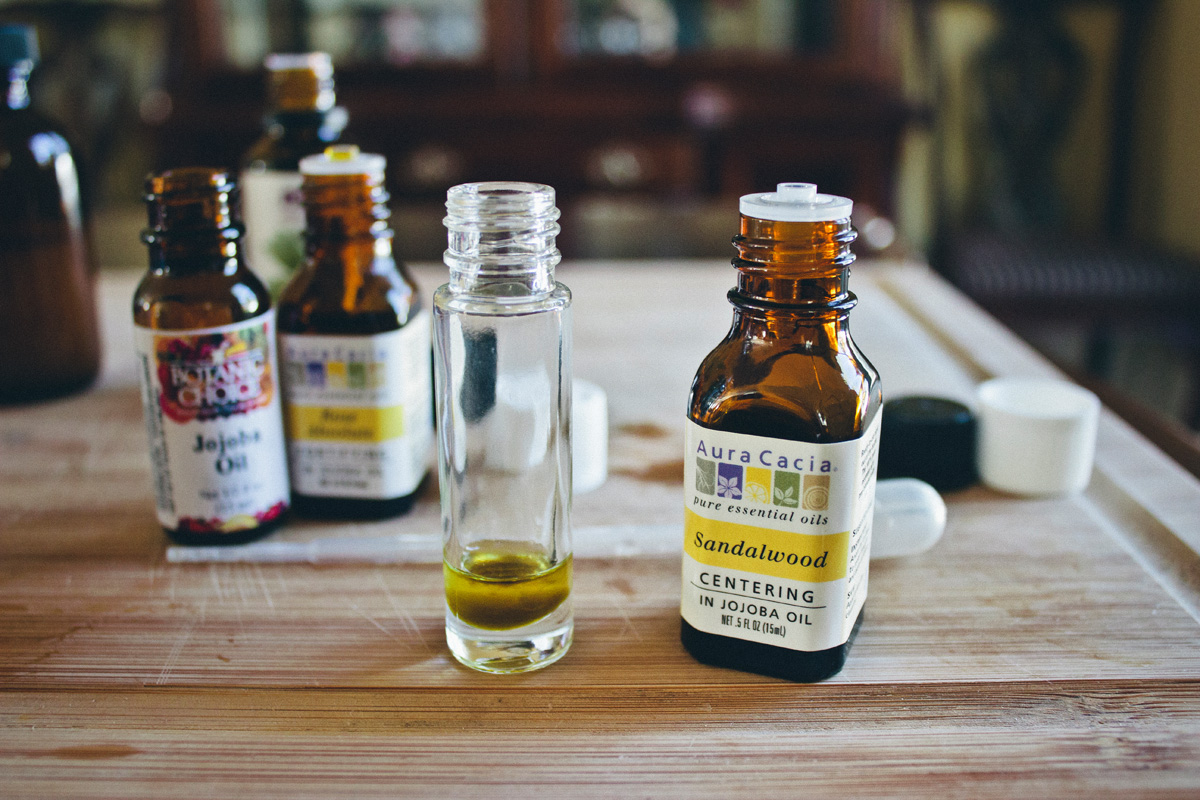
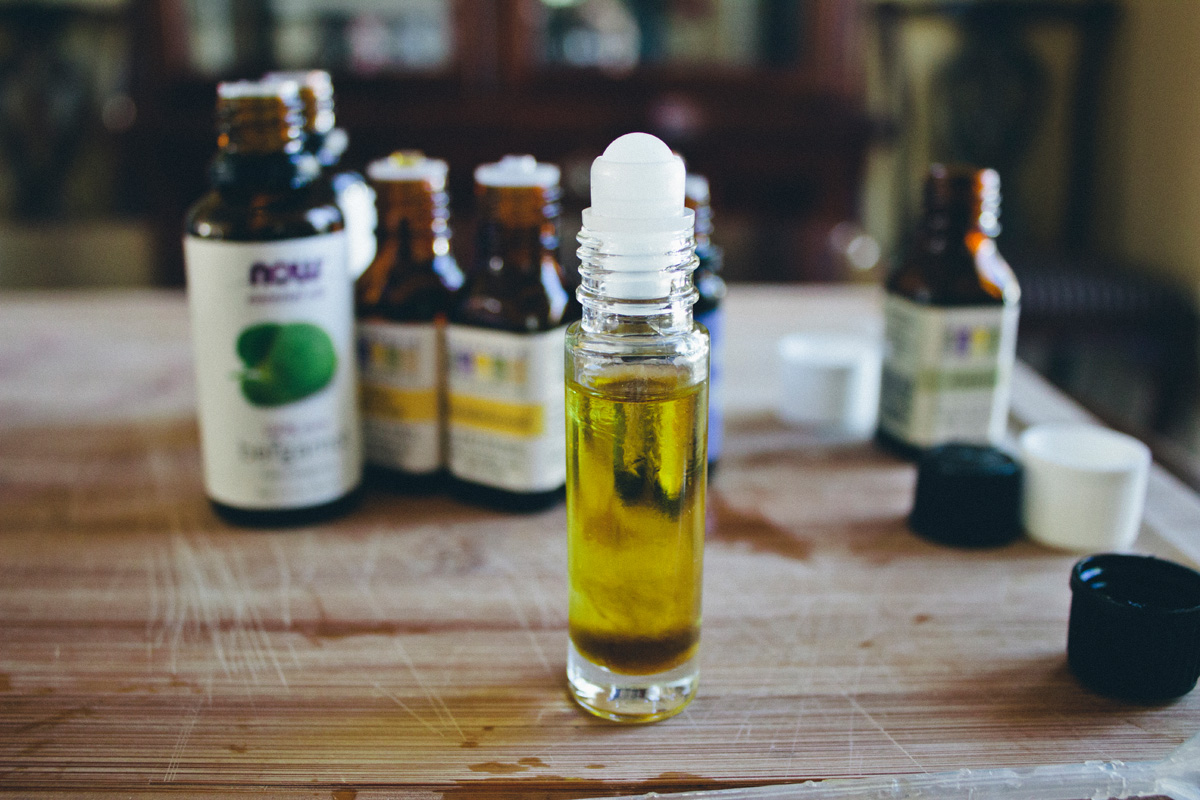
Depending on your use for the essential oil, that may effect how many drops to use and what carrier oil to pair with. Essential oils typically come diluted with a carrier oil, which is as direct application of some essential oils can cause skin irritation. Really, most essential oils you may buy are pre-mixed with a carrier oil, like jojoba. But if not, you can always combine your essentials with coconut, almond, or grapeseed oil for better skin absorption.
There are a ton of great pre-discovered essential oil aroma combos floating around the web, especially if you are looking for a specific or familiar scent. It can also be kinda fun to find your own special mix. Of course some oils provide more specific aromas: woody and musky or sweet and floral. Or if you're focusing primarily on the healing effects of an oil, it may be better to keep the mix as simple as possible.
When making your own perfumes, try to include a few essential oils that act as fixatives as these fragrances tend to leave the skin quickly. Oil form fixatives include angelica, calamus, orris, vetiver, and musk. You can also add alcohol (or vodka) to your mix as an disinfectant, say if you're making an aftershave. Here's a quick profile rundown on the oils that we used, in no particular order.
Clary Sage
Clary sage has an enduring scent, and acts well as a fixative when making perfumes. It is fairly similar to its common counterpart, garden sage. Historically, clary sage has shown to improve vision and eye health. It has been suggested avoiding this essential oil when drinking alcohol or driving due to its opiate effect.
Botanical Name: Salvia sclarea
Aromatic Notes: Earthy, spicy, nutty, herbaceous, bittersweet
Medicinal Properties: Supports healthy eyes, good vision, and may brightens eyes. Calms the nervous system, relieves depression, eases stress and insomnia, uplifts poor moods, aids in digestion, eases muscle pains, and acts as an antispasmodic and antiseptic. Clary sage can be successful in healing for many female functions like periods, menopause, and relaxation during labor.
Bergamot
Bergamot is a citrus fruit with tropical origins. Its essential oil is extracted from the rind of the fruit. Aside from medicinal and aromatic uses, bergamot is actually most commonly used as a key ingredient in Earl Grey tea. Random pro tip: direct sunlight should be avoided after direct application of concentrated bergamot oil.
Botanical Name: Citrus bergamia
Aromatic Notes: Fresh, citrusy, spicy, floral, warm
Medicinal Properties: May treat depression, relieves tension and fear, can be used to treat anorexia, eczema, and acne. Bergamot is effective in disinfecting wounds, treating infections, reliving bodily pain, and stimulating the liver. It can also greatly aid in promoting the secretion of digestive acids and enzymes.
Juniper Berry
Fun fact is that juniper berry is used to flavor alcoholic beverages like gin, ya know aside from improving blood circulation and curing kidney stones. Juniper is popular in the old testament, native american medicine, and historically Mongolian women in labor. Studies have been done to show its effectiveness specifically in treating ailments of the genitourinary system (male reproductive and urinary system).
Botanical Name: Juniperus communis
Aromatic Notes: Earthy, sweet, woody, fresh
Medicinal Properties: May cure rheumatism and arthritis, can aid in weight loss, stimulates functions, promotes urination and therefore eases bloating, encourages healthy digestion, and helps regulate the menstrual cycle. This oil may also treat acne, eczema, psoriasis, dandruff, and cellulitis. Use juniper oil when hungover or recovering from addiction.
Vetiver
Vetiver is particularly popular in India and in Indian culture, identified as "Khus", used in the perfumes, soaps, and the food and beverage industry. Vetiver is said to improve with age -- funny enough (aroma)therapeutically used for support and a sense of being grounded. It is commonly found in perfumes for its fixative properties. Topically, this oil can be used for bad acne and and scarring by promoting the growth of new skin.
Botanical Name: Vetiveria zizanoides
Aromatic Notes: Smokey, earthy, spicy, woody, musty
Medicinal Purposes: May help dispel anger, anxiety, irritability, and hysteria. Helps with physical exhaustion, inflammation, muscular pains, and arthritis. Vetiver can also relieve imbalanced hormones and relieve insomnia. Generally great for helping the body heal itself.
Rose Oil (Absolute and Otto)
Roses have an enduring history of being revered for both their medicinal qualities and lush fragrance. The rich warmth of its scent has shown to relieve grief and anxiety, and promote love, support, happiness, romance, and luxury. The rose is also effective in repairing mature skin and soothing hormonal imbalance. Because extracting the oil from the rose is so extraneous, pure rose oil is often extremely expensive. In fact, a single rose blossom contains only about 0.02% of the essential oil - or about 30 roses to produce a single drop of oil. Though the rose and its distinct scent has become widely commercialized through lotions and creams, be weary of whether those products actually provide an rose properties rather than pure chemical make-up. Note: In these perfume recipes we used rose absolute. Rose absolute is a high-quality liquid extraction of fragrant compounds from rose blossoms. This absolute is extracted from rose plant solids via pure alcohol, which absorbs the fragrant properties from the original plant concrete. After evaporation and filtration, what is left is essentially the rose fragrance with essential oil elements (like left overs). Because pure rose oil is somewhat difficult to extract and therefore quite expensive, rose absolute can be an effective and economic alternative. Consequently, rose absolute is more frequently used for perfume purposes, and also provides fixative qualities when mixing oils for your DIY perfumes. For full aromatherapy benefits, we recommend using rose otto (read below).
Botanical Name: Rosa damascena
Aromatic Notes: Strong, floral, warm, rich, romantic
Medicinal Purposes: Uplifting, supportive, aids in grief and depression, provides relief from menopause and hormonal imbalance (thought of as the woman's oil), nourishes mature skin, heals eczema, acts as an aphrodisiac, and in low doses can be helpful for insomnia.
Sandalwood
There are three distinct varieties of sandalwood - Indian, Hawaiian, and Australian. Indian Sandalwood is considered to be the highest quality and have the most effecting therapeutic effects. However the Australian variety is the most popular and most commercially used. Historically, sandalwood was precieved as a sign of diginity and respect, and generally mandatory at religious rituals by the Hindu. Sandalwood may relieve skin irritations and foreskin impotency. Pro tip: when yr chakra is off, sandalwood may be able to help. Caution: never use pure sandalwood oil on skin, always dilute with another oil like jojoba or coconut.
Botanical Name: Santalum Album; Santalum Ellipticum; Santalum Spicatum
Aromatic Notes: Woody, warm, floral, mild, musky, balmy
Medicinal Purposes: Soothing, warming, uplifting, calming, antibacterial. antiseptic, antispasmodic, and astringent. Historically valued for its calming properties and helping one to find their inner peace. Sandalwood is also often used for chronic infections effecting the lungs and can be used to treat bronchitis, laryngitis, and dry coughs.
Frankincense
If frankincense is good enough for baby jesus, its good enough for us.
Botanical Name: Boswellia carterii
Aromatic Notes: Woody, spicy, peppery, balmy, citrusy Note: the scent of frankincense varies greatly depending on its country of origin
Medicinal Purposes: Has shown to heal bronchitis, extreme coughing, and asthma. May lessen the appearance of stretch marks (sup preggorz Mary) and scars. Can calm emotions, sooth anxiety, be meditative, and even sedative. The antiseptic qualities of frankincense can be a barrier against oral problems like bad breath, toothaches, and mouth sores.
Jojoba Oil
Jojoba oil is a natural oil that makes for an incredible moisturizer: its structure closely resembles that or our own skin sebum (glands which secrete oil). It is incredibly resilient and blends well with fragrances. It is incredibly nourishing for dry or broken hair due to its quick absorption, and is often found in many commercial hair products. Obvs it makes a great carrier of essential oils for any homemade perfumes.








